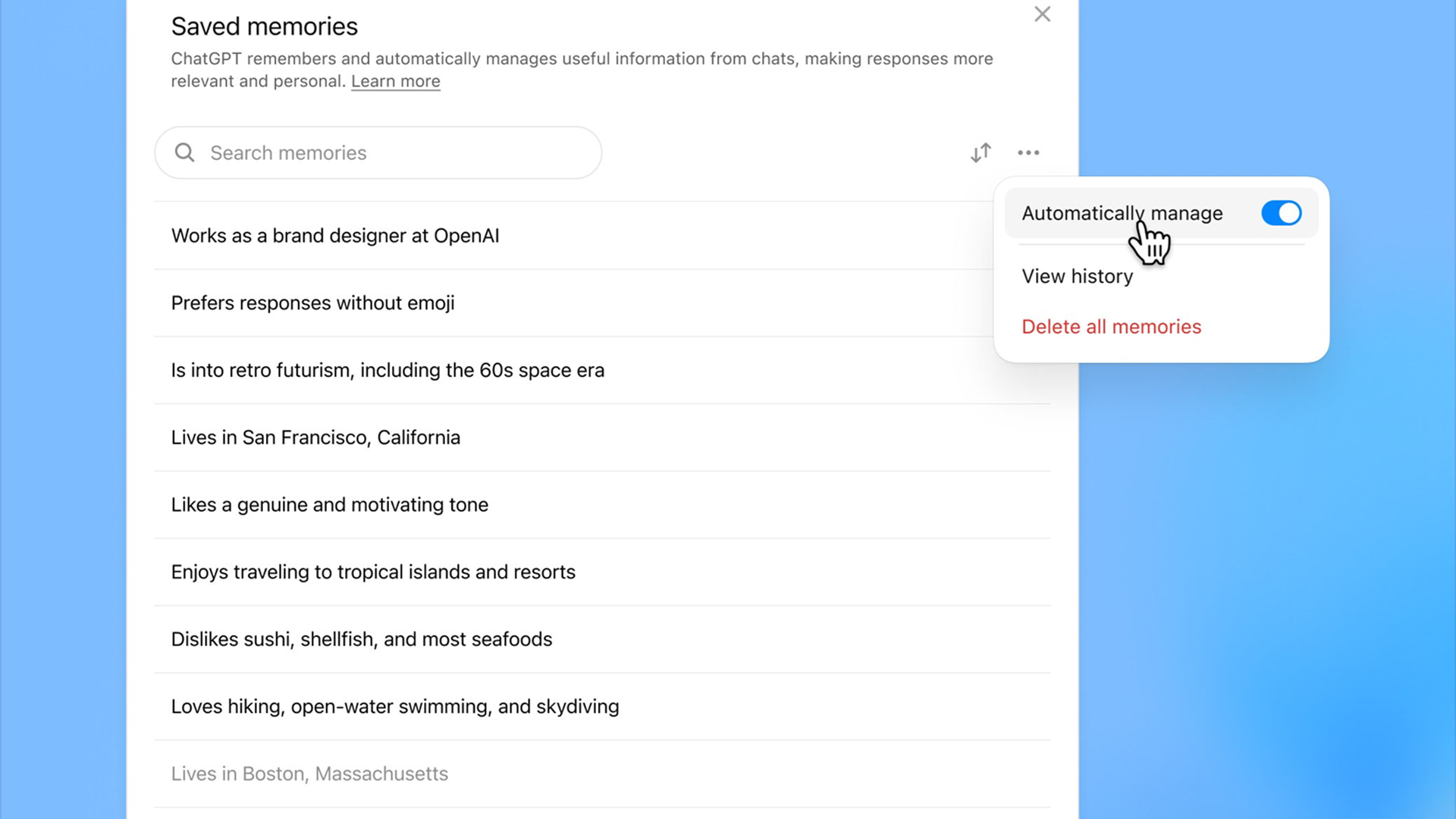ChatGPT is smarter now that it's learned to forget - a huge memory upgrade is coming
The AI chatbot will remember what matters most and quietly let the rest fade

Sign up for breaking news, reviews, opinion, top tech deals, and more.
You are now subscribed
Your newsletter sign-up was successful
ChatGPT’s memory feature transformed the AI chatbot by letting it remember facts shared across conversations, allowing users to have a somewhat personalised version that knows their name, preferences, and even their coffee order if they want. Now, OpenAI is giving ChatGPT's memory a powerful enhancement: the ability to forget.
But while ChatGPT accumulated data on users either added manually or that the model concluded was important, it had some fundamental problems. Manually managing, reviewing, and deleting memories as necessary is tedious enough, but not doing it would mean running into an annoying “memory full” message.
That's why the new automatic memory prioritisation rolling out for ChatGPT is so intriguing. Giving the model the ability to decide which memories are still relevant, what can fade into the background, and how to keep your conversations useful is potentially enormous.
ChatGPT decides what stays “top of mind” based on how recently and frequently you’ve mentioned something. It’s a little like how your own brain filters what to focus on in any given moment. ChatGPT isn’t erasing anything; it’s just learning to weigh information in a way that feels more natural.
If you’ve spent the last week asking about toddler sleep schedules, that’ll rise to the surface. If you haven’t brought up your sourdough starter since June, it quietly moves lower on the list. All of this happens without you having to manually prune anything, which is good news for those of us who treat digital settings menus the same way we treat appliance manuals: with vague respect and active avoidance.
ChatGPT can now automatically manage your saved memories—no more “memory full.”You can also search and sort memories by recency, and choose which to re-prioritize in settings.Rolling out to Plus and Pro users on the web globally starting today. https://t.co/T1vSNH5289 pic.twitter.com/xRHLFTu2AmOctober 15, 2025
This memory rework is deceptively simple in concept but radical in implication. With little fanfare, OpenAI has taught ChatGPT to self-sort. And that pushes it from a reactive tool into something better designed for the long haul.
You still have full control over ChatGPT's memory, it should be said. You can scroll through your memories, see what ChatGPT thinks is “top of mind,” and adjust it like you’re editing a playlist.
You can bump up a memory about your dietary restrictions, downgrade your brief but intense obsession with medieval cheese trivia, or just wipe things out entirely. You can even roll back memories to previous versions.
AI memory banks
But the biggest change isn’t in what you can do, it’s in what you don’t have to do anymore. Until now, the memory system has been one of ChatGPT's most high-maintenance aspects. Power users could get a lot out of it, but it required you to keep things in order like a digital closet. The more you used it, the more you had to manage it.
Sign up for breaking news, reviews, opinion, top tech deals, and more.
That’s fine if you’re the type to keep your desktop files colour-coded and your email inbox at zero. But for the average person who just wants their chatbot to remember they like their coffee iced and their emails polite, the old system was too much work.
Now, at least theoretically, ChatGPT treats your preferences less like a static list of facts and more like a shared digital document you're both editing. In that sense, this isn’t just a technical update. It’s a social one.
It's worth saying that manually checking ChatGPT memories is probably still a good idea, as the AI can mess up there just as much as in its responses to prompts, but that’s where it looks like OpenAI is trying to strike a balance.
The memory system is automatic, but not opaque. You can see exactly what’s stored. You can reprioritise. You can delete. You can even shut it off completely. But memory isn’t just a luxury add-on. For any AI assistant worth its salt, it’s going to become foundational.
Because without memory, and ideally a memory full of actually relevant information, most AI tools have a ceiling of usefulness. They can answer questions and brainstorm, but lack the continuity that makes for better tools long-term. It's not flashy, but automated memory management is ultimately a pretty memorable idea for a feature.
Follow TechRadar on Google News and add us as a preferred source to get our expert news, reviews, and opinion in your feeds. Make sure to click the Follow button!
And of course you can also follow TechRadar on TikTok for news, reviews, unboxings in video form, and get regular updates from us on WhatsApp too.
You might also like

Eric Hal Schwartz is a freelance writer for TechRadar with more than 15 years of experience covering the intersection of the world and technology. For the last five years, he served as head writer for Voicebot.ai and was on the leading edge of reporting on generative AI and large language models. He's since become an expert on the products of generative AI models, such as OpenAI’s ChatGPT, Anthropic’s Claude, Google Gemini, and every other synthetic media tool. His experience runs the gamut of media, including print, digital, broadcast, and live events. Now, he's continuing to tell the stories people want and need to hear about the rapidly evolving AI space and its impact on their lives. Eric is based in New York City.
You must confirm your public display name before commenting
Please logout and then login again, you will then be prompted to enter your display name.